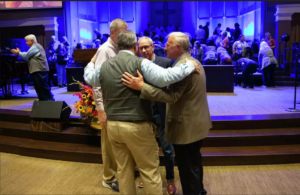Presbyterian pastor Thomas Campbell got himself in trouble in 1809 for preaching fiery sermons about Christian unity. His continuing call to discard denominational labels for unity with all who call on the name of the Lord got him censured by his presbytery and then fired by his synod in western Pennsylvania. At about the same time, another Presbyterian preacher in Kentucky named Barton Stone dissolved his presbytery to unite with everyone who would simply be known as Christians.
Stone and Campbell had met each other earlier at the Cane Ridge Revival, a Presbyterian communion meeting in Kentucky. Then, in September of 1809, Campbell wrote the Declaration and Address of the Christian Association of Washington County, Pennsylvania. It was a call to Christian unity based on Jesus’ prayer in John 17 and the whole of Scripture that presents complete unity among all disciples of Christ as the holy will of God. Here is an excerpt from the opening lines:
The Church of Christ upon earth is essentially, intentionally, and constitutionally one, consisting of all those in every place that profess their faith in Christ and obedience to him in all things according to the Scriptures… All that are enabled, thro’ grace, to make the Christian confession, and to manifest the reality of it in their tempers and conduct, should consider each other as the precious saints of God, should love each other as brethren, children of the same family and Father, temples of the same Spirit, members of the same Body, subjects of the same grace, objects of the same divine love, bought with the same price, and joint heirs of the same inheritance. Whom God hath thus joined together no man should dare to put asunder.
Towards the end of that great document, Campbell wrote, “What? Shall we pray for a thing and not strive to obtain it?”
The Declaration and Address became a founding document for the American Restoration Movement, a Christian unity movement that produced the Churches of Christ. See, everybody in the Churches of Christ have a little Presbyterian blood in us. We all owe a debt of gratitude to the good Presbyterians who refused to let denominational differences separate them from other followers of Jesus.
It is in that spirit of unity and fellowship with all disciples of Christ that the 4 Midland churches come together on this Sunday before Thanksgiving.
 I am preaching at First Presbyterian Church in Midland this morning while my brother and friend Steve Schorr, the pastor at First Presbyterian, is preaching at GCR. Steve Brooks, the preacher at First Methodist, and Darin Wood, the pastor at First Baptist, are also swapping pulpits as part of our annual 4 Midland Sunday. Then this evening, we are hosting our annual Thanksgiving service at GCR. Cory is leading a combined choir made up of singers from all four churches, Steve Brooks is bringing the message, and we’re all going to sing and pray and hear the Word together in the presence of our God who calls us to be one. Christian unity is God’s will, it is Christ’s prayer, and it is the reconciling work of the Holy Spirit. And our four churches are leaning in.
I am preaching at First Presbyterian Church in Midland this morning while my brother and friend Steve Schorr, the pastor at First Presbyterian, is preaching at GCR. Steve Brooks, the preacher at First Methodist, and Darin Wood, the pastor at First Baptist, are also swapping pulpits as part of our annual 4 Midland Sunday. Then this evening, we are hosting our annual Thanksgiving service at GCR. Cory is leading a combined choir made up of singers from all four churches, Steve Brooks is bringing the message, and we’re all going to sing and pray and hear the Word together in the presence of our God who calls us to be one. Christian unity is God’s will, it is Christ’s prayer, and it is the reconciling work of the Holy Spirit. And our four churches are leaning in.
I feel so very honored and privileged and blessed by God for our friendships and partnerships in the Gospel. And exceedingly thankful. Thankful to the Lord, thankful to my colleagues in these other three churches, and thankful for the people in our congregations who are committed to closer fellowship and deeper unity in Christ. And exceedingly thankful for those good Presbyterians who more than 200 years ago committed to Christian unity with all who call on the name of our Lord and gave us the tradition that first instilled the faith in me.
Peace,
Allan

Leave a Reply